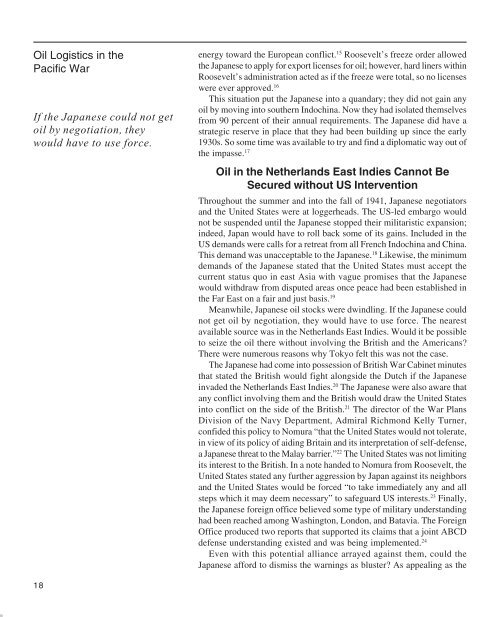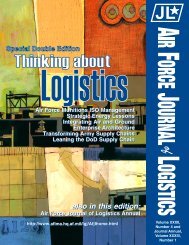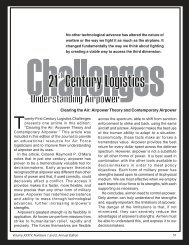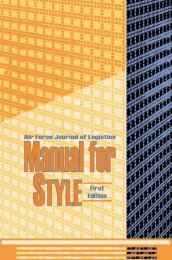Old Lessons, New Thoughts - AF Logistics Management Agency
Old Lessons, New Thoughts - AF Logistics Management Agency
Old Lessons, New Thoughts - AF Logistics Management Agency
Create successful ePaper yourself
Turn your PDF publications into a flip-book with our unique Google optimized e-Paper software.
Oil <strong>Logistics</strong> in the<br />
Pacific War<br />
If the Japanese could not get<br />
oil by negotiation, they<br />
would have to use force.<br />
18<br />
energy toward the European conflict. 15 Roosevelt’s freeze order allowed<br />
the Japanese to apply for export licenses for oil; however, hard liners within<br />
Roosevelt’s administration acted as if the freeze were total, so no licenses<br />
were ever approved. 16<br />
This situation put the Japanese into a quandary; they did not gain any<br />
oil by moving into southern Indochina. Now they had isolated themselves<br />
from 90 percent of their annual requirements. The Japanese did have a<br />
strategic reserve in place that they had been building up since the early<br />
1930s. So some time was available to try and find a diplomatic way out of<br />
the impasse. 17<br />
Oil in the Netherlands East Indies Cannot Be<br />
Secured without US Intervention<br />
Throughout the summer and into the fall of 1941, Japanese negotiators<br />
and the United States were at loggerheads. The US-led embargo would<br />
not be suspended until the Japanese stopped their militaristic expansion;<br />
indeed, Japan would have to roll back some of its gains. Included in the<br />
US demands were calls for a retreat from all French Indochina and China.<br />
This demand was unacceptable to the Japanese. 18 Likewise, the minimum<br />
demands of the Japanese stated that the United States must accept the<br />
current status quo in east Asia with vague promises that the Japanese<br />
would withdraw from disputed areas once peace had been established in<br />
the Far East on a fair and just basis. 19<br />
Meanwhile, Japanese oil stocks were dwindling. If the Japanese could<br />
not get oil by negotiation, they would have to use force. The nearest<br />
available source was in the Netherlands East Indies. Would it be possible<br />
to seize the oil there without involving the British and the Americans?<br />
There were numerous reasons why Tokyo felt this was not the case.<br />
The Japanese had come into possession of British War Cabinet minutes<br />
that stated the British would fight alongside the Dutch if the Japanese<br />
invaded the Netherlands East Indies. 20 The Japanese were also aware that<br />
any conflict involving them and the British would draw the United States<br />
into conflict on the side of the British. 21 The director of the War Plans<br />
Division of the Navy Department, Admiral Richmond Kelly Turner,<br />
confided this policy to Nomura “that the United States would not tolerate,<br />
in view of its policy of aiding Britain and its interpretation of self-defense,<br />
a Japanese threat to the Malay barrier.” 22 The United States was not limiting<br />
its interest to the British. In a note handed to Nomura from Roosevelt, the<br />
United States stated any further aggression by Japan against its neighbors<br />
and the United States would be forced “to take immediately any and all<br />
steps which it may deem necessary” to safeguard US interests. 23 Finally,<br />
the Japanese foreign office believed some type of military understanding<br />
had been reached among Washington, London, and Batavia. The Foreign<br />
Office produced two reports that supported its claims that a joint ABCD<br />
defense understanding existed and was being implemented. 24<br />
Even with this potential alliance arrayed against them, could the<br />
Japanese afford to dismiss the warnings as bluster? As appealing as the





